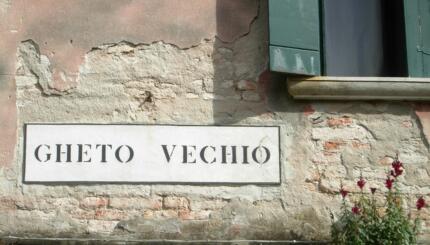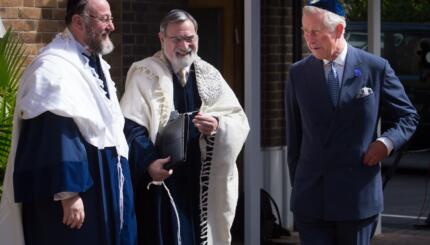Baruch Spinoza — sometimes referred to as Benedict Spinoza in English — was a 17th-century Dutch Jewish philosopher considered one of the most important thinkers of his era, articulating then-controversial views about theology, politics, ethics and rationalism that deeply influenced later Enlightenment thinkers. In the Jewish context, Spinoza is perhaps best-known for being the target of an order of excommunication (herem) for heresy from the Jewish community of Amsterdam, which accused him of “evil opinions” and “monstrous deeds.”
Spinoza was born to Sephardic Jews in 1632 and raised in the Spanish-Portuguese Jewish community of Amsterdam. His family had fled the Iberian peninsula after the expulsion of the Jews from Spain in 1492, perhaps publicly converting to Catholicism but maintaining Jewish practice in secret like many Jews at the time. The family eventually arrived in the Netherlands where they resumed living outwardly as Jews. Spinoza’s father was a successful merchant who rose to prominence in the Amsterdam Jewish community, becoming a warden of the synagogue and the Amsterdam Jewish school.
Spinoza lived during a period known as the Dutch Golden Age, an era in which Dutch global influence was at its peak and Amsterdam was a major commercial center teeming with artists, philosophers and scientists. An intellectually gifted child, he was educated in a Jewish school and studied with Rabbi Manasseh ben Israel, a scholar, theologian and kabbalist whose works were widely studied in non-Jewish circles. He also studied under Francis van den Enden, a former Jesuit and a supporter of democracy (not a common position at the time) who is presumed to have taught Spinoza Latin and introduced him to European philosophy.
Spinoza’s ties to the Jewish community would begin to weaken even before his excommunication, but he was in his early years a practicing Jew. After his father died in 1654, Spinoza recited the Mourner’s Kaddish for 11 months, in keeping with the traditional custom. Yet around this time he seems to have assimilated further into non-Jewish Dutch society, going to live with van den Enden, adopting the name Benedict, and deepening his identification with his country’s secular culture.

Help us keep Jewish knowledge accessible to millions of people around the world.
Your donation to My Jewish Learning fuels endless journeys of Jewish discovery. With your help, My Jewish Learning can continue to provide nonstop opportunities for learning, connection and growth.
These actions likely precipitated the action taken against him on July 27, 1656, when he was formally excommunicated by the Jews of Amsterdam following a 30-day period in which Spinoza was enjoined to repent and declined. The pronouncement against him, written in Portuguese, reads as follows:
The chiefs of the council make known to you that having long known of the evil opinions and acts of Baruch de Spinoza, they have endeavored by various means and promises, to turn him from his evil ways. But having failed to make him mend his wicked ways, and, on the contrary, daily receiving more and more serious information about the abominable heresies which he practiced and taught and about his monstrous deeds, and having for this numerous trustworthy witnesses who have deposed and born witness to this effect in the presence of the said Espinoza, they became convinced of the truth of this matter; and after all of this has been investigated in the presence of the honorable hakhamim [wise men], they have decided, with their consent, that the said Espinoza should be excommunicated and expelled from the people of Israel…
By decree of the angels and by the command of the holy men, we excommunicate, expel, curse and damn Baruch de Espinoza, with the consent of God, Blessed be He, and with the consent of the entire holy congregation, and in front of these holy scrolls with the 613 precepts which are written therein; cursing him with the excommunication with which Joshua banned Jericho and with the curse which Elisha cursed the boys and with all the castigations which are written in the Book of the Law. Cursed be he by day and cursed be he by night; cursed be he when he lies down and cursed be he when he rises up. Cursed be he when he goes out and cursed be he when he comes in. The Lord will not spare him, but then the anger of the Lord and his jealousy shall smoke against that man, and all the curses that are written in this book shall lie upon him, and the Lord shall blot out his name from under heaven. And the Lord shall separate him unto evil out of all the tribes of Israel, according to all the curses of the covenant that are written in this book of the law. But you that cleave unto the Lord your God are alive every one of you this day.
The particular offense Spinoza committed remains a matter of scholarly dispute. His major philosophical work, Ethics, wouldn’t be published for another two decades. And the document of excommunication doesn’t specify any “monstrous deeds.” Jean Maximillian Lucas, one of Spinoza’s friends and one of his earliest biographers, wrote that, contrary to the common view that Spinoza was guilty of heresy, he was convicted “only of a lack of respect for Moses and the law.” It’s possible that Spinoza’s observance had waned, something for which other Amsterdam Jews at the time would also incur the community’s wrath. But it’s also likely that he was already expressing some of the controversial views he would later formulate systematically in his written works, including his rejection of the notion that God acts in the world for particular providential purposes and his assertion that the Torah’s obligations were no longer binding on Jews.
Some have also speculated that the Amsterdam community, made up of no small number of former conversos who had long practiced Judaism in secret and likely had assimilated some Christian practices, was particularly keen on enforcing proper Jewish doctrine among its members, pointing to its liberal use of sanctions against individuals for a variety of religious and ethical offenses. Others have suggested that the Jewish community was acting out of self-interest, as Spinoza’s ideas were considered anathema by the wider Dutch society as well.
Whatever the reasons, the measures taken against Spinoza were the most extreme the community had ever taken. According to Lucas’ account, the ceremony of excommunication was one of high drama, with black candles burning and the doors of the Holy Ark opened. “Afterwards, the cantor, from a slightly elevated place, intones in a gloomy voice the words of the excommunication, while another cantor blows a horn, and the wax candles are turned upside down so that they fall drop by drop into a vessel filled with blood,” Lucas wrote.
Spinoza was, by the standards of his day, liberal. He believed democracy was the highest form of government. He supported intellectual and political freedom. He applied a critical, scientific lens to his consideration of the Hebrew Bible and to the theological questions that animated the work of many leading philosophers of the time. And his ideas are often described as precursors to important later work in the fields of biblical criticism, metaphysics and ethics.
In 1670, 14 years after his excommunication, he published Tractatus Theologico-Politicus, in which he offered a sustained critique of Judaism, arguing that religion and philosophy ought to be kept separate and claiming that supernatural phenomena found in the Bible have natural explanations. He further rejected the notion of Jewish chosenness and suggested that the Torah, being a product of a certain time and place, should no longer be considered valid. Perhaps anticipating the controversial nature of such views, the work was originally published anonymously. Even Christian authorities found the work reprehensible, and it was banned by the Synod of Dordrecht in 1674.
In 1670, Spinoza moved to the Hague, where he lived in modest circumstances and continued to work on his writings. He earned a modest living as an optical lens grinder, which some suggest may have played a role in his death at 44 of a lung illness. He is buried in a church cemetery in the Hague. Spinoza’s most important work, Ethics, was published posthumously, in 1677.
Centuries later, Spinoza is widely hailed as one of most important European philosophers, but in the Jewish community he is still capable of generating controversy. In 2015, hundreds showed up for a symposium in Amsterdam that aimed to consider whether the excommunication against him should be formally lifted. (It wasn’t.) And in 2021, a Spinoza scholar making a documentary about the philosopher was denied entry to the Portuguese synagogue by Rabbi Joseph Serfaty, who declared the scholar persona non grata before wishing him a happy Hanukkah. Days later, Serfaty’s decision was overturned by the board responsible for the synagogue.
Louis Jacobs, founding rabbi of the New London Synagogue, is a renowned scholar and lecturer. c. Louis Jacobs, 1995. Published by Oxford University Press. All rights reserved. No part of this material may be stored, transmitted, retransmitted, lent, or reproduced in any form or medium without the permission of Oxford University Press.
Hasidic
Pronounced: khah-SID-ik, Origin: Hebrew, a stream within ultra-Orthodox Judaism that grew out of an 18th-century mystical revival movement.
Help us keep Jewish knowledge accessible to millions of people around the world.
Your donation to My Jewish Learning fuels endless journeys of Jewish discovery. With your help, My Jewish Learning can continue to provide nonstop opportunities for learning, connection and growth.
Talmud
Pronounced: TALL-mud, Origin: Hebrew, the set of teachings and commentaries on the Torah that form the basis for Jewish law. Comprised of the Mishnah and the Gemara, it contains the opinions of thousands of rabbis from different periods in Jewish history.
Help us keep Jewish knowledge accessible to millions of people around the world.
Your donation to My Jewish Learning fuels endless journeys of Jewish discovery. With your help, My Jewish Learning can continue to provide nonstop opportunities for learning, connection and growth.



